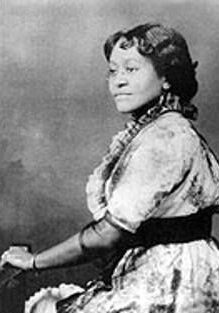
Achieving this requires a community offering personal and spiritual support, access to resources, and compassion when things falter. In our 21st century world of changing economies and job opportunities, cultivating entrepreneurship and generosity will help us see more progress on poverty alleviation as well as lay foundations for future generations to flourish.
Annie Turnbo Malone
At some point in our lives, most of us have received an invitation to a house — or online — party to sell an array of products. If you’re older, you remember door-to-door sales for household products. This is often an industry of women, for women. And, what most people don’t know, is that it began long before Mary Kay or Young Living. A changing economic and work landscape pushes workers toward an enterprising spirit, which continues to adapt to trends. And has a history few people know. In the late 19th and early 20th century, African Americans labored under the oppression of segregation and limited access to economic opportunities. Even under such political and social oppression, there were vibrant local churches, educational institutions, businesses, and economic and social networks that flourished. The creativity, innovation, and opportunities of African American entrepreneurs leave a legacy of wisdom that we can apply in our changing times.
One such leader was Annie Turnbo Malone. Annie Turnbo Malone, daughter of former slaves, was a fearless leader and entrepreneur. She broke through business barriers obstructing black women from earning equal income and was a pioneer in multi-level marketing. She was a philanthropist, a community champion, and uplifted those around her — especially women. She empowered underemployed African American women with the resources they needed to start their own micro-businesses. In doing all this, she is one of the first female African American millionaires.
The faith and work of Annie Turnbo Malone
Malone’s entrepreneurial spirit was rooted in deep faith and work, which helped her endure many challenges, including divorce, business competition, and many who objected to her generosity. This same faith unleashed her creativity and helped find solutions to hair products for African American women, helping solve the problem of stunted hair growth and health in a safe manner. She developed haircare products for African American women in her kitchen. Her first product was the Wonderful Hair Grower. It was a great step forward in quality and safety. She began her company with three sales agents and employed a new strategy for sales: free treatments. Three sales agents escalated quickly to thousands.
This rapid growth in the first decades of the 20th century allowed her to purchase a building for her Poro College, Incorporated. She provided housing and clothing for her employees. They had their own laundry and sewing facility to create uniforms for more than just the staff. The company had a medical unit that treated its students and African Americans in the community. From a bakery to an ice cream parlor, it was a comprehensive, well-decorated, and communal space that included a performing arts auditorium. Over the years, more locations were purchased, and the company grew steadily. So did Malone’s philanthropy, with millions given to a variety of causes benefitting the African American community. Her generosity was sometimes excessive to some, and when she died, her fortune was quite small. The other reason her fortunes declined was that she trusted people who did not manage resources well.
Malone’s company preceded well-known and respected companies like Mary Kay, creating a flourishing community of sales agents who were able to earn income for themselves and leave demeaning jobs that did not pay well. She owned her supply chain — making her products, packing them, and even owning a garage, which housed a fleet of trucks to deliver her products because some trucking companies refused to work with her. She was determined to succeed by helping others succeed. One of her early employees, Sarah Breedlove (who would eventually become known as Madame CJ Walker), later became a rival in the haircare market. They both provided great products for women and quality improved with competition, even as the personal relationship cooled.
Local church and economic flourishing in history
Malone’s story is part of a larger narrative of prosperous African American enterprises during the Jim Crow era (1876-1965), including businesses, educational institutions, social enterprises and many more. Faith-driven entrepreneurship that uplifts the community is not a recent notion, but the normal practice of these women and men who succeeded against huge personal and social barriers.
As we consider how the local church can help bring economic flourishing to her community, the example of Annie Turnbo Monroe offers one key idea and a shining vision of integration: empower people to participate in their own sustainable business and then inspire generosity as they meet their family’s needs and help others. Achieving this requires a community offering personal and spiritual support, access to resources, and compassion when things falter. In our 21st-century world of changing economies and job opportunities, cultivating entrepreneurship and generosity will help us see more progress on poverty alleviation as well as lay foundations for future generations to flourish.





